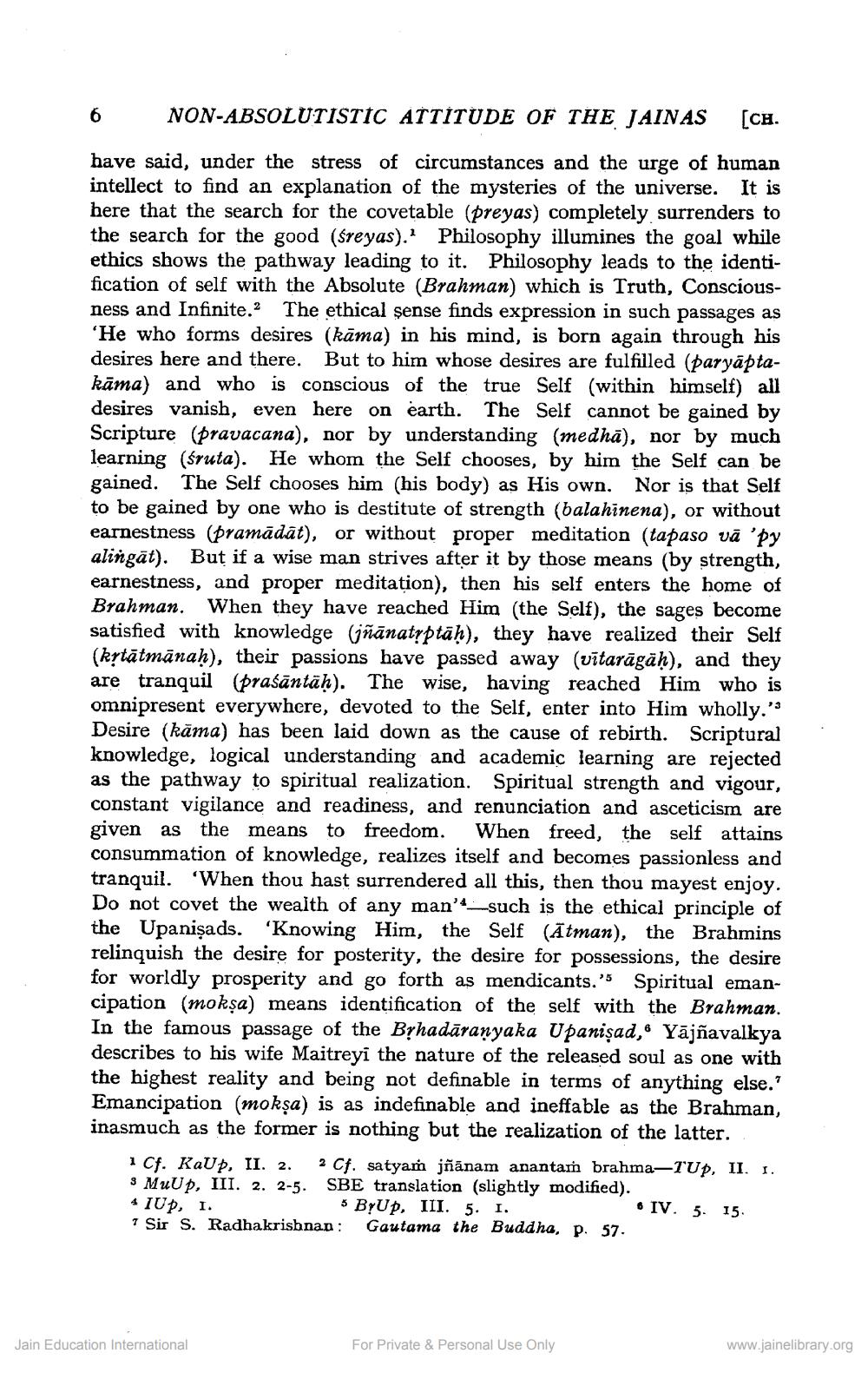________________
6
NON-ABSOLUTISTIC ATTITUDE OF THE JAINAS (CH.
have said, under the stress of circumstances and the urge of human intellect to find an explanation of the mysteries of the universe. It is here that the search for the covetable (preyas) completely surrenders to the search for the good (śreyas).' Philosophy illumines the goal while ethics shows the pathway leading to it. Philosophy leads to the identification of self with the Absolute (Brahman) which is Truth, Consciousness and Infinite.2 The ethical sense finds expression in such passages as 'He who forms desires (kāma) in his mind, is born again through his desires here and there. But to him whose desires are fulfilled (paryāptakāma) and who is conscious of the true Self (within himself) all desires vanish, even here on earth. The Self cannot be gained by Scripture (pravacana), nor by understanding (medhā), nor by much learning (śruta). He whom the Self chooses, by him the Self can be gained. The Self chooses him (his body) as His own. Nor is that Self to be gained by one who is destitute of strength (balahinena), or without earnestness (pramādāt), or without proper meditation (tapaso vā 'py alingāt). But if a wise man strives after it by those means (by strength, earnestness, and proper meditation), then his self enters the home of Brahman. When they have reached Him (the Self), the sages become satisfied with knowledge (ñanatrptah), they have realized their Self (krtātmānah), their passions have passed away (vitarāgäh), and the are tranquil (praśāntāh). The wise, having reached Him who is omnipresent everywhere, devoted to the Self, enter into Him wholly.'s Desire (kāma) has been laid down as the cause of rebirth. Scriptural knowledge, logical understanding and academic learning are rejected as the pathway to spiritual realization. Spiritual strength and vigour, constant vigilance and readiness, and renunciation and asceticism are given as the means to freedom. When freed, the self attains consummation of knowledge, realizes itself and becomes passionless and tranquil. "When thou hast surrendered all this, then thou mayest enjoy. Do not covet the wealth of any man'' _such is the ethical principle of the Upanişads. Knowing Him, the Self (Ātman), the Brahmins relinquish the desire for posterity, the desire for possessions, the desire for worldly prosperity and go forth as mendicants.'s Spiritual emancipation (mokşa) means identification of the self with the Brahman. In the famous passage of the Byhadāranyaka Upanişad, Yājñavalkya describes to his wife Maitreyi the nature of the released soul as one with the highest reality and being not definable in terms of anything else." Emancipation (mokșa) is as indefinable and ineffable as the Brahman, inasmuch as the former is nothing but the realization of the latter.
1 Cf. KaUp, II. 2. ? Cf. satyam jñānam anantam brahma-TUP, II. 1. 9 MuUp, III. 2. 2-5. SBE translation (slightly modified). * IUP, I. 5 ByUp, III. 5. I.
IV. 5. 15. 7 Sir S. Radhakrishnan: Gautama the Buddha, p. 57.
Jain Education International
For Private & Personal Use Only
www.jainelibrary.org




